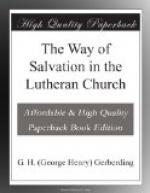We object fifthly that at these so-called revivals there is a dependence on methods not sanctioned or authorized by the Word of God. As we have seen, God’s means are generally slighted. On the other hand, human means and methods are exalted and magnified.
The anxious or mourner’s bench is regarded by many otherwise sensible people, as a veritable mercy-seat, where Grace is supposed to abound—as though the Spirit of God manifested His saving and sanctifying power there as nowhere else. But this is a purely human institution, and has no warrant in the Word. On this point it is not necessary to enlarge.
CHAPTER XXV.
MODERN REVIVALS, CONTINUED.
We continue our objections to the modern revival system.
Our sixth objection is the utter indifference to doctrine that generally goes hand in hand with its methods and practices. To “contend earnestly for the faith once delivered to the saints,” seems to be altogether out of place at a modern revival. There is no “taking heed unto the doctrine,” or “holding fast the form of sound words,” or “becoming rooted and built up in Christ, and established in the faith as ye have been taught.” There is no counselling to “be no more children, tossed to and fro and carried about with every wind of doctrine;” no warning against false teachers and false doctrines. Instead of thus following Christ and His Apostles, in insisting on the truth, the faith, and the doctrine; instead of thus warning against error and false doctrine, and showing that it “doth eat as a canker,” and endanger the very salvation of the soul, the modern revival system habitually inveighs against all such loyalty to the truth, and contending for the faith and pure doctrine, as bigotry, intolerance, lack of charity, if not lack of all “experimental religion.” In many quarters indeed the idea is boldly advanced that the more a person stands up for pure doctrine, for Word and Sacrament as channels of Grace, the less Grace he has; and the more he makes light of doctrine, the less positive conviction he has; the less he thinks of creeds, catechism, and confessions of faith, the more religion he has! The popular sentiment is: it makes no difference what a person believes, or to what Church he belongs, or indeed, whether he belongs to any, if only he is converted; if only he means well; if only the heart is right! Now, it is not necessary to show here again that all such indifference to doctrine is directly contrary to the teaching of Christ and His Apostles.




